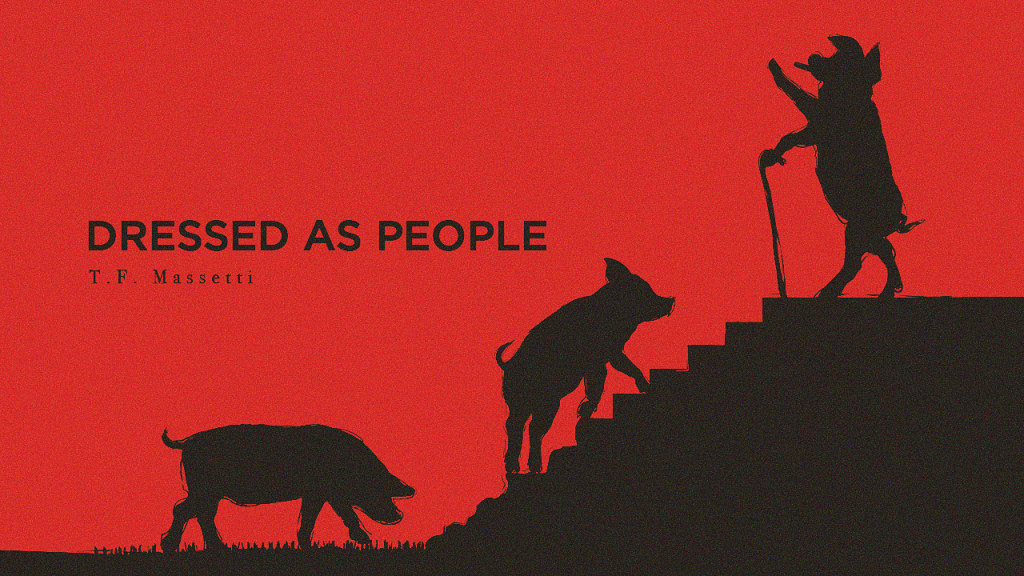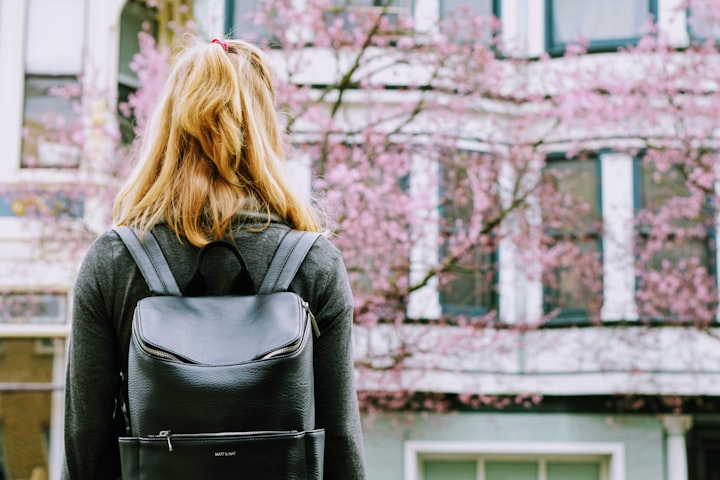
The old man walked slowly, bent and crumpled like a bad draft in the trash bin. He was fast for his age—leaning over a cane, focused on not slipping—but for the streets of New York he dragged. Logan paced respectfully behind the mister, checking his newsfeed through the shattered screen of his phone.
He was going to miss his train, anyway.
‘New York City’s crime rates hit record low,’ read the headline. If he doesn’t walk faster, Logan thought. That might change.
It was a narrow pathway, between two thawing mounds of snow. As the sun crept back over the streets of Bushwick so did the cigarette buds, candy wrappers, and dog waste. Freed from their frosty hibernation, they trickled by the old man’s shoes.
The elder’s wardrobe was pristine. He wore a hampered color palette, old fashioned from top to bottom. His refinement belonged in the past—just like his speed. The contrast between him and Logan rivaled dog shit on snow.
Black, skinny jeans clenched around spindly legs, an oversized crewneck sweater, an old beanie stuffed over his unshorn hair, and a pair of ink-stained shoes. Logan was the polar opposite of the nostalgic elegance that dallied before him. Yet he refused to overtake the old man. Not solely out of respect.
He didn’t like snow in his shoes. So Logan kept scrolling.
Apparently, some big-shot artist made an exorbitant amount of money for a subway station installation in Manhattan. Logan cringed at the pictures. Dogs dressed as people—like an Orwellian ending translated into something cute. Based on the comments, it was money better spent elsewhere. Incredible how an artist’s name is worth more than the work—
Logan stumbled. He pocketed his phone and looked down at the slit of sidewalk. He had tripped over a sketchbook. A black leather cover, clasped shut with a slick elastic closure and a bookmark ribbon, sticking out like a tongue. A Moleskine, in good condition. Back in college, if you didn’t have one you weren’t a true artist.
“Excuse me, sir,” Logan said, picking it up and drying it off with his sleeve. “You dropped your notebook.”
The old man turned around with three rhythmic thumps of his cane. He examined Logan head to toe, noticing him for the first time. He frowned at the Moleskine.
“No, son,” he said, waving. “That’s not mine.”
Logan stood there, surrounded by the things that once hid under the snow, and watched the man walk away.
***
Logan sat on his bed and sketched. A cat wearing a spacesuit. Not exactly novel, but he had long given up on originality. The college student who treasured every idea had been replaced with a doubting artist, worried only about cross-hatching in the right direction.
And paying rent without his father’s help.
The basement’s radiator was temperamental, so Logan wore a hoodie, despite the blankets layered over his naked legs. The scent of weed and the sound of hip-hop upstairs slithered under his door. His four roommates cared as much for his peace, as the landlord cared for their warmth.
He inked the cat’s backpack remote control unit, dreading the quality of every stroke. Why do I keep trying? he thought, staring at his drawing. Look at Sabrina. An Upper West Side apartment, a Harvard degree and a job that pays ninety dollars an hour. And I was supposed to be the smart sibling. But following their father’s footsteps—the way she did—sounded like a nightmare. Walking around in a suit, carrying a briefcase up to some seventieth-floor, treating people’s struggles as potential income.
There was no money that could buy his freedom. His integrity. Even if freedom meant sleeping in a humid dungeon, often visited by a mouse or two.
He felt guilty about keeping the notebook. He leafed through it, looking for a name, a number or address, but found nothing. He was sorry for whoever lost it, but no sense letting a quality Moleskine go to waste.
Somehow an astronaut cat seemed a worthwhile treatment of its pages. With a marker, he began to add some blue to the cat’s visor.
You know all those hatches will be a nightmare, right? he asked himself as the colors bled in, bringing the space-feline to life. Why do you have to be such a perfectionist? Couldn’t you have gone for a simpler style? Logan sighed. He cared too much about skill and too little about making a statement.
He lit up a cigarette, stared at the finished piece and closed the notebook, certain that his work was worthless. He tossed the Moleskine on his desk, turned off the lights, and attempted to sleep.
Rent was due soon. And—once again—the talented Logan Beckman trod dangerously near to making that call.
To ask mommy and daddy for help.
***
“Roast beef with hash browns on a hero, pack of Spirits, a double shot expresso and the chips?” the cashier asked, tucking a curl behind her ear. “Is that it?”
Logan nodded and smiled as he swiped his card. “Thanks. Have a good one,” he said, plucking the bag and putting up his hood as he left the deli.
He never knew if the cashier was hitting on him or just being nice. Logan walked five blocks over—almost every day—because the smokes were cheaper and the sandwiches were amazing.
He was used to getting women’s attention. More now, as his pubescent looks faded into his thirties—even though the long-desired beard still showed no signs. But neither did the long-feared receding hairline.
Elbowing his daily needs, freshly-lit cigarette in one hand and smartphone in the other, Logan walked home to the sound of sirens and half-thawed ice crunching under his boots.
He realized he never asked the cashier’s name.
The girl treated him nicely, gave him discounts and free stuff and Logan never even considered knowing more about her. Maybe because part of him was afraid to like her. Or maybe it was just him bowing to his father’s expectations.
She was just a cashier, after all.
Logan still dreamed of that perfect redhead he would meet at a laundromat, take on a date in a restaurant by the river, and fall—gradually but madly—in love.
She was smart, talented, didn’t care that he smoked or lived in a basement. She supported herself with her art, fulfilled his sexual fantasies, had great taste in music and his parents loved her like her own daughter.
She also didn’t exist.
So he walked back home with hands turning red. Smoking and texting was more important than warm fingers.
Bushwick wasn’t as thrilling as it used to be. The art, the music, and the extravagant clothes that once seemed cinematic now reeked of arrogance. Of mediocrity. Of failure.
Logan scrolled absently through his screen as he shuffled past a crowd of try-hard hipsters. His feet guided themselves to his apartment. Nothing was new anymore.
From the corner of his eye, Logan saw a mural. It took him a few seconds to process. He walked back and stared at the wall.
Vibrant colors, strokes of varying thickness, scientific fidelity in the figure’s gear. Skillful cross-hatching, always in the right directions.
The bag slipped down his elbow as his arms weakened. Impossible, he thought.
It was a cat in a spacesuit.
***
It was sunny again. Logan’s mood was always enhanced by sunshine. But not when he thought he was going crazy.
In the last ten days, he’d showered once, eaten whatever his stomach held down, and slept a broken sleep—scattered like smoke on a windy New York day. Logan had lost count of the cigarettes, as he lit a fresh one.
He trudged around the neighborhood, startled at every person passed. His hair was shaggier than ever, plastered over his forehead. The shadow under his eyes granted him years and his stench granted him scowls.
He flipped frantically through the Moleskine. His latest drawing was a cow eating dinner while humans grazed outside. Where would it appear this time? It was never far from his apartment. His artwork now populated the neighborhood and the pieces were starting to draw attention. Even from the media.
Ten days. Ten drawings on the notebook. Ten murals, appearing exactly as he drew them. Stroke by stroke, they emerged randomly on walls, often covering another artist’s piece without the smallest shred of respect for his peers.
He couldn’t find a pattern. He tried to understand, to reason, to see some logic. He refused to believe. It was something that belonged in books. In fairytales.
Even saying it out loud scared him… a magical notebook.
People talked about the mysterious artist who brought “Orwellian commentary with flawless execution” to the walls of Brooklyn. A local art magazine even called him the next Banksy.
He turned the corner of Stanhope and there it was, a crowd around it.
A short girl with a kind smile posed in front of the cow while her boyfriend took photos and gave directions, her clothes matching the mural’s palette. A guy in round spectacles and a half-grown beard took photos with a battered phone and showed them to a friend smoking a blunt. A girl in a fur coat took selfies by the grazing humans while someone yelled at her about animal rights. People drove by, honking with their smartphones out.
Logan dragged his feet among the crowd. Onlookers and admirers made way to his smell, unaware that the art they revered was the work of that very—stinking—artist. They weren’t a figment of his mind. He lit another cigarette and made his way back home, considering taking a shower and accepting the reality.
He had found a magical notebook.
Logan flicked the cigarette bud and climbed the steps to his building. He opened the door to his apartment, relieved to see it was empty. His roommates were out working their shitty jobs.
On the rug by the door, lay a letter.
Who the fuck sends a letter? he thought.
***
Logan stepped off the train and into the station. His work was still there. The pigs stood on their hind legs, wearing suits and dining at the farmer’s table. The classic Orwellian reference—the Animal Farm explosive finale—covered the controversial weimaraners.
The city had tried to remove them, to no success. The mysterious Moleskine artwork resisted any attempt. They tried to scrub it out, used various chemicals, painted over it and even commissioned the artist to redo the dog mosaics. The morning after, the pigs would be back, sipping their wine and smiling, triumphant.
Dressed as people.
Logan jogged up the steps into the City’s crowded streets, almost stumbling over a crumpled old man with a cane. There was still an eerie feeling of achievement when he saw his work, unsigned, unclaimed, and undiscovered. Just another element of the vibrant New York fauna. Thriving, more than a year after its execution.
Logan still didn’t understand, still didn’t have a logical explanation. He had come to terms with the fact he wasn’t crazy, and that some things were better left unexplained. That his life could use some unjustified bewilderment.
The twenty thousand dollars of the anonymous commission surely helped.
That letter bought not only his silence, but his comfort. His hope that life could indeed be more exciting. But the money wasn’t what saved him. He donated most of it—after leaving the Bushwick basement—to institutions that brought art workshops to vulnerable youth around the boroughs. A cause he believed in.
He lifted the collar of his topcoat and walked into Manhattan. He was on his way to meet Emily. He had finally asked her name. And his parents did love her like their own daughter.
Most of all, she existed. Just like that notebook’s… magic.
About the Creator
Tiago Masseti
Recovering Prog Metal Musician/Reluctant Graphic Designer/Advancing SciFi & Fantasy Writer. Brooklyn-based after moving from city to city for years on a row.






Comments
There are no comments for this story
Be the first to respond and start the conversation.